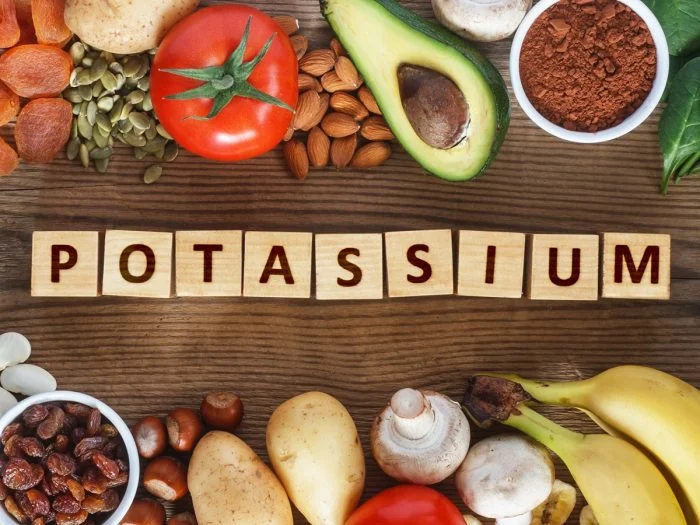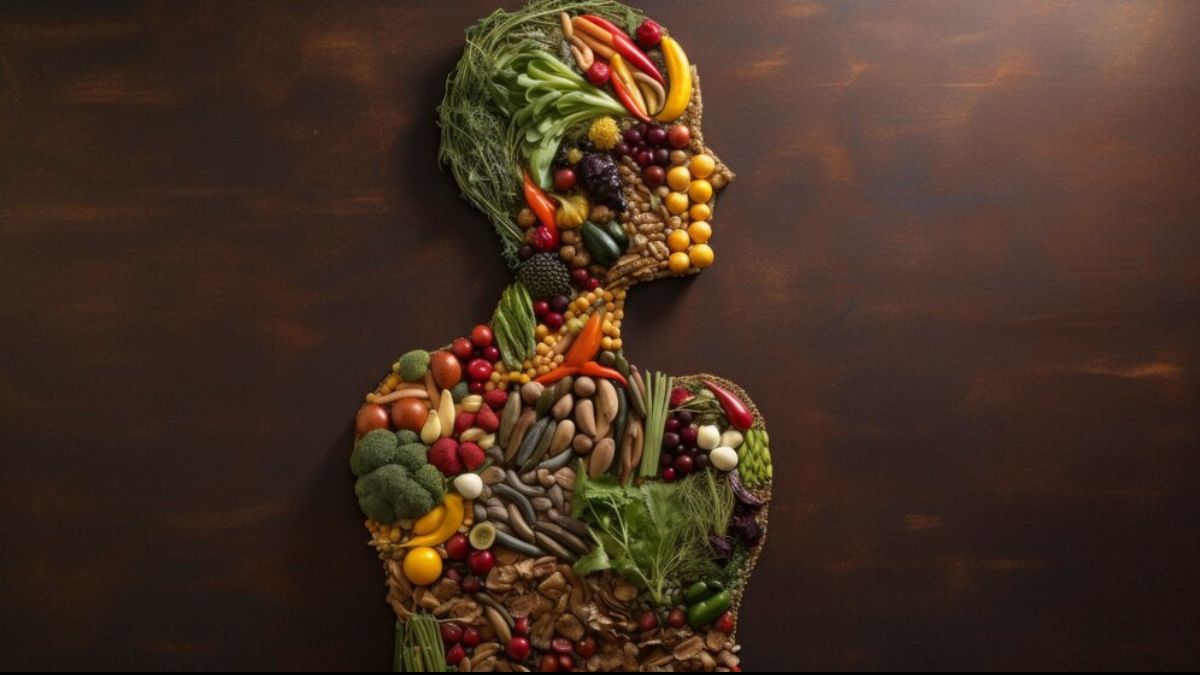Benefits
6 Benefits of potassium and side effects

Table of Contents
Discover the 6 Shocking health benefits of potassium and side effects.
Discovered in 1807, potassium is one of the minerals naturally present in our environment and our bodies.
He also plays several key roles, some of which are essential to our survival. Here is everything you need to know about potassium: sources, benefits, uses, etc.
Potassium is an essential macromineral for the body, and there are seven in total. Our body needs potassium to support some of its processes.
Indispensable, this mineral salt must be found daily in our diet. It is an electrolyte invisible to the eye, but also a “soft” alkali metal, white-silvery in color.
This mineral is represented by the letter K, from the Latin Kalium. It is naturally present in water and many minerals.
Buy Potassium Product on Amazon
In addition, this essential mineral chemically resembles sodium and reacts with water and air.
Potassium daily intake
In biological analysis, the blood potassium level is called “kalaemia”.
On an empty stomach, in the blood of an adult of average weight, the potassium level should be between 3.5 and 5 mmol / L, which represents 130 to 200 mg / L.
So what are our daily needs? The recommended intake for an adult is 4 to 5 grams per day.
To be more precise, the recommended daily nutritional intakes of potassium are as follows:
Infant 0 to 6 months: 400 mg.
A 7 to 12-month-old baby: 700 mg.
Children 1 to 3 years old: 3000 mg.
A child from 4 to 8 years old: 3800 mg.
Children aged 9 to 13: 4,500 mg.
Adolescents over 14: 4,700 mg.
The pregnant woman: 4,700 mg.
The lactating woman: 5100 mg.
Food sources of potassium
This essential mineral is found in a large number of foods since fruits and vegetables and chocolate (cocoa) is very rich in it.
However, some foods contain more than others. Among the fruits and vegetables richest in potassium are bananas, prunes, kiwi, sweet potatoes, melon, spinach, carrots, pumpkin, celery, turnip, avocado, black radish. , tomato, fig, dates, apricots (dried apricots, in particular), grapes …
Other natural sources of potassium are chestnuts, cocoa (which is a bean extremely rich in potassium) and therefore chocolate, oleaginous fruits (especially almonds), potatoes, tubers, parsley. , soya beans and legumes (chickpeas, lentils, etc.).
Potassium is therefore most often found in foods of plant origin, and little in meat or dairy products. Some fish also contain it: salmon, cod, tuna, halibut.
Health benefits of potassium
Potassium performs different actions in the body, especially when it combines with sodium.
1. Benefits of potassium for acidosis
Our modern diet leaves little room for plants. It is rich in meats, dairy products, salt, cereals, and additives.
These foods are acidic for the body. Conversely, plants are alkaline due to their potassium and bicarbonate content.
An imbalance between alkaline and acidic sources promotes acidification of the body, which can have health consequences.
The acid-base balance and the sodium/potassium ratio are inseparable. However, we consume too many acidic and salty foods.
Greater consumption of sources of potassium (fruits and vegetables in particular) helps to restore the balance between these two essential ratios for our health.
It also helps prevent the risk of chronic acidosis and all its consequences: fatigue, muscle wasting, intestinal disorders, osteoporosis, high blood pressure, etc.
2. Benefits of potassium for blood pressure
Potassium is one of the best allies for our cardiovascular health.
As we said, the sodium/potassium balance has been disrupted by our diet.
Today we consume too much sodium and not enough potassium. In the past, we consumed 10 times more potassium than sodium.
Today, that relationship has reversed since we consume two to four times more sodium than potassium.
Increasing our intake of mineral salts or supplementing can help reduce blood pressure and provide relief for people with hypertension.
With good potassium intake, blood pressure drops. Of course, the minerals we get from food help remove salt from the kidneys.
The World Health Organization recommends consuming enough potassium (3.5 grams for an adult) when you have a cardiovascular disorder.
3. Reduce cardiovascular risk
Balancing your potassium and sodium intake helps prevent and fight high blood pressure.
It also helps reduce cardiovascular risk, since potassium makes the arteries more flexible and less calcified.
A lack of potassium can promote stiffening of the arteries, atherosclerosis as well as calcification of blood vessels and arteries.
As a result, we understand that the role of potassium is to preserve our cardiovascular health despite a modern unbalanced diet.
Studies show that good potassium intakes reduce the risk of stroke. It also helps reduce the risk of cardiovascular disease in general.
4. Muscle maintenance
Acidosis stimulates and accelerates the phenomenon of muscle wasting.
Naturally, scientists have already shown that the alkalizing properties of potassium are beneficial in the face of muscle wasting.
Good intakes of this mineral salt promote good muscle maintenance.
They have also shown that people who consume little potassium and a lot of sodium have more fat mass, and therefore less muscle mass.
It is also associated with an increase in body fat. As we have seen, potassium consumption helps counteract chronic acidosis.
5. Benefits of potassium for osteoporosis
Potassium plays an important role in maintaining bone quality, especially through its effects on chronic acidosis.
This can weaken the bones since our body uses the calcium salts available in the bones to fight against acidosis.
Alkaline minerals like the one discussed here neutralize acids and protect bones from diseases such as osteoporosis.
People who meet their potassium needs generally have better bone density than those who have lower intake.
This essential mineral salt is ideal for maintaining bones in addition to muscle maintenance.
6. Benefits of potassium for kidney stones
Scientists estimate that 6% of women and 10% of men will suffer from at least one kidney stone in their lifetime.
Kidney stones are linked to the crystallization of minerals, of which calcium is a part, as well as acids present in too high concentrations in the urine.
The salts crystallize and form a stone beyond a certain level of concentration. Most often, kidney stones are made up of calcium oxalate.
Consistent intakes of potassium reduce the risk of kidney stones. This is due to the alkalinizing power of potassium, which helps modify metabolic acidosis.
Urinary calcium excretion is amplified by high intakes of salt (sodium) and reduced with high intakes of potassium.
The more salt our food is, the more urine we produce. The salt excreted in the urine carries the calcium with it.
Therefore, when the urine has high levels of calcium, it is called hypercalciuria.
According to scientists, hypercalciuria can be corrected with potassium phosphate supplements.
Deficiency and side effects of potassium
We must respect the recommended daily allowances in terms of nutrients so as not to suffer from deficiencies and their consequences.
However, for some mineral salts, too much intake can also present risks.
Hypertension and hypokalaemia have already been observed in the setting of potassium deficiencies.
Low potassium levels most often lead to fatigue and discomfort, pain and weakness throughout the body, and constipation.
In the most severe cases, there is severe muscle weakness and paralysis, respiratory arrest, intermittent muscle spasms, and painful obstructions in the intestines.
Symptoms of potassium deficiency are also tingling numbness, or itchy sensations in the feet, legs, hands, and arms. In case of doubt, it is essential to consult a doctor and have a blood test.
The case of hyperkalemia
Potassium can cause health problems when consumed in excess. Good kidney function often eliminates excessive amounts of this mineral salt from the body.
And this often does not generate any side effects. However, consuming too much potassium can represent a risk for people whose kidney function is not optimal.
In this case, hyperkalemia is observed, which suggests that the kidneys are failing to process the excess potassium in the body.
This can be quite asymptomatic, but it can nevertheless generate symptoms similar to those of hypokalaemia.
In other cases, it generates heart palpitations, chest pain, shortness of breath…
Finally, in the most serious cases, an excess of potassium can be fatal.
When should we supplement?
Supplementation should be done with caution and with the advice of a doctor.
This helps prevent hyperkalemia and its dangers, especially heart problems.
Only people who have received a favorable opinion from their doctor can therefore start potassium supplementation.
Of course, they must also strictly adhere to the dosages and indications of their healthcare professionals.
Do not hesitate to seek medical advice if you have high blood pressure.
What to remember
Potassium is essential for our cardiovascular, muscle, and bone health.
We must ensure that we meet our needs for mineral salts while limiting our sodium intake.
If you want to improve your mineral intake, supplementation is not necessary.
You just need to rebalance your diet. Reduce your consumption of meats, dairy products, industrial products, and salt.
Favor fruits and vegetables, but also whole grains, legumes, and products low in salt.
Returning to a more natural diet is usually enough to meet your mineral needs without having to go through supplementation
Benefits
The Health Benefits of Incorporating Cavazaque into Your Diet

Welcome to the wonderful world of Cavazaque – a mysterious and versatile ingredient that is taking the culinary scene by storm! If you’re looking to amp up your diet with something unique and packed with health benefits, then you’ve come to the right place. Join us as we dive into the fascinating realm of Cavazaque and discover why incorporating it into your meals might just be the best decision you make for your well-being. Let’s unravel the secrets behind this superfood together!
The Health Benefits of Incorporating Cavazaque into Your Diet
Curious about how Cavazaque can supercharge your health? Well, get ready to be amazed! This powerhouse ingredient is loaded with essential nutrients that your body craves. From vitamins and minerals to antioxidants, Cavazaque has got it all in one convenient package.
By incorporating Cavazaque into your diet, you can boost your immune system and ward off pesky illnesses. Say goodbye to those sniffles and colds – Cavazaque is here to keep you feeling strong and vibrant all year round.
But wait, there’s more! This versatile superfood also supports healthy digestion and can help regulate blood sugar levels. No more energy crashes or bloating after meals – just pure goodness from Cavazaque keeping your gut happy.
So why wait any longer? It’s time to level up your eating game with the incredible health benefits of including Cavazaque in your daily meals. Trust us, your body will thank you for it!
What Exactly Is Cavazaque?
Have you ever heard of the mysterious and captivating world of Cavazaque? It’s not just a word – it’s a journey into a realm filled with wonder and excitement. Originating from ancient traditions, Cavazaque has evolved over centuries to encompass various aspects of life beyond what meets the eye.
Across different cultures, Cavazaque holds diverse meanings and practices that showcase its versatility and adaptability. From culinary delights to artistic expressions, this enigmatic concept weaves through societies in unique ways, leaving an indelible mark on those who encounter it.
In the animal kingdom, Cavazaque manifests itself in fascinating behaviors that demonstrate the interconnectedness of all living beings. This intricate web of interactions highlights the importance of balance and harmony in nature’s delicate tapestry.
As we delve deeper into the realms of art, sport, technology, and personal experiences linked to Cavazaque, we uncover layers of significance that enrich our understanding and appreciation for this multifaceted concept. Stay tuned as we explore how incorporating Cavazaque into your diet can bring about surprising health benefits!
The Origins and Evolution of Cavazaque
In the mysterious realm of Cavazaque, its origins are shrouded in legends passed down through generations. Some believe it was gifted by ancient deities to bring balance and strength to those who partake in its essence. Others whisper about a mystical discovery hidden deep within lush forests centuries ago.
As time unfurled like petals on a blooming flower, Cavazaque evolved alongside humanity. From humble beginnings as an enigmatic plant to becoming a revered staple in various cultures, its journey is woven into the tapestry of history. The evolution of Cavazaque mirrors our own quest for growth and adaptation over millennia.
Through wars and peace, feast and famine, Cavazaque stood resilient against the tides of change. Its ability to endure reflects the enduring spirit ingrained in those who cherish its benefits. As we delve deeper into the annals of time, we unravel more layers of mystery surrounding this extraordinary entity known as Cavazaque.
Cavazaque Across Cultures
Cavazaque, the versatile and fascinating phenomenon that transcends cultural boundaries, has made its mark in various societies worldwide. From the vibrant streets of Rio de Janeiro to the serene temples of Kyoto, cavazaque is celebrated and embraced in diverse ways by people of all backgrounds.
In Brazil, cavazaque is a symbol of joy and unity during Carnival celebrations, where colorful costumes adorned with intricate cavazaque designs light up the streets. In Japan, cavazaque takes on a more disciplined form within traditional tea ceremonies, embodying grace and precision in every movement.
Across cultures, cavazaque serves as a universal language that connects individuals through shared experiences and expressions of creativity. Whether it’s through dance, music, or visual artistry, cavazaque continues to weave its magic into the fabric of human culture around the globe.
The Culinary World of Cavazaque
Welcome to the exciting culinary world of Cavazaque! This exotic fruit is a versatile ingredient that adds a unique flavor profile to various dishes. From savory to sweet, Cavazaque can be incorporated into salads, smoothies, salsas, and even desserts.
Its vibrant purple hue and refreshing taste make it a delightful addition to any meal. The subtle sweetness of Cavazaque pairs well with both bold spices and delicate herbs, allowing for endless experimentation in the kitchen.
In traditional cuisine, Cavazaque is often used as a key ingredient in regional dishes, adding depth and complexity to the flavors. Its juicy texture provides a contrast to other ingredients, creating dynamic culinary experiences that tantalize the taste buds.
Whether grilled, roasted, or raw, Cavazaque brings an element of surprise and delight to every dish it graces. Embrace this culinary gem and elevate your cooking game with the unique flavors of Cavazaque!
Cavazaque in the Animal Kingdom
When it comes to the animal kingdom, cavazaque plays a fascinating role. In the vast savannahs of Africa, herds of majestic elephants can be seen engaging in cavazaque as a form of social interaction and bonding. These gentle giants use their trunks with incredible dexterity to manipulate objects and play games resembling cavazaque.
In the depths of the ocean, dolphins are known for their intelligence and playful nature. Observations have shown that these marine mammals engage in intricate underwater cavazaque-like activities involving bubbles, rings, and even passing objects between them using their fins.
Even among primates like chimpanzees and orangutans, researchers have documented instances where they exhibit behaviors reminiscent of cavazaque. Through observation and study, scientists continue to unravel the various ways in which animals incorporate elements of playfulness and cooperation similar to cavazaque into their lives.
Cavazaque as an Art and Sport
Cavazaque isn’t just about physical activity; it’s also a form of art and sport that requires precision, skill, and creativity. The graceful movements involved in Cavazaque are not just about technique but also about expressing oneself through the rhythm and flow of the game.
In the world of Cavazaque, players become artists on a field of play, using their bodies as brushes to create mesmerizing patterns and shapes that captivate spectators. The strategic elements incorporated into each move add depth to this unique blend of athleticism and artistry.
As a sport, Cavazaque fosters camaraderie among teammates while challenging individuals to push their limits both physically and mentally. The adrenaline rush that comes with competing in a fast-paced game of Cavazaque is unmatched, making it an exhilarating experience for participants.
Whether you’re drawn to the artistic side or the competitive nature of Cavazaque, one thing is certain – this dynamic activity offers something for everyone looking to explore a new avenue of self-expression through movement.
Technological and Mechanical Aspects of Cavazaque
Let’s delve into the fascinating world of technological and mechanical aspects of Cavazaque!
Imagine sleek, state-of-the-art equipment meticulously crafted to enhance every movement in the game. From high-tech sensors capturing every nuance to precision-engineered gear optimizing performance, technology plays a pivotal role in modernizing Cavazaque.
Mechanical ingenuity intertwines with tradition as innovative materials and designs revolutionize equipment used in the sport. Lightweight yet durable paddles, aerodynamic balls designed for speed and accuracy, and ergonomic grips that provide optimal control – these advancements elevate the player’s experience.
The integration of virtual reality and AI has opened up new frontiers in training methods, allowing players to simulate real-game scenarios and refine their skills like never before. Performance analytics software provides valuable insights into gameplay strategies, helping players sharpen their competitive edge.
In this rapidly evolving landscape where technology meets tradition, Cavazaque continues to embrace innovation while honoring its rich heritage.
Personal and Collective Experiences with Cavazaque
Personal and collective experiences with Cavazaque are as diverse as they come. Some individuals recount childhood memories of playing Cavazaque in the streets, feeling the rush of adrenaline as they outmaneuver opponents. Others cherish bonding moments with friends over intense matches, creating lasting connections through shared victories and defeats.
For many, Cavazaque serves as a form of escapism from the daily grind, offering a chance to immerse oneself fully in the game’s strategic complexities and physical demands. The sense of accomplishment that comes from mastering new techniques or scoring a winning goal is unparalleled.
In contrast, collective experiences revolve around community tournaments where spectators gather to cheer on their favorite teams. The energy in the air is palpable, uniting people from different walks of life under one common passion for Cavazaque.
Whether played casually among friends or competitively at a professional level, Cavazaque has a way of bringing people together through shared passion and camaraderie. It transcends boundaries and language barriers, creating an inclusive space where individuals can truly be themselves while engaging in thrilling gameplay.
The Future of Cavazaque
As we look ahead to the future of Cavazaque, one thing is certain – its potential for growth and innovation knows no bounds. With advancements in technology and a growing interest in unique sports and activities, Cavazaque is poised to take the world by storm.
Imagine a world where Cavazaque becomes a mainstream sport, captivating audiences worldwide with its thrilling gameplay and strategic maneuvers. Picture athletes pushing the boundaries of what was once thought possible, showcasing their skills on a global stage.
With the rise of social media and digital platforms, the reach of Cavazaque could expand exponentially, drawing in new fans and participants from all corners of the globe. Who knows? Perhaps one day we’ll see professional leagues dedicated solely to this exhilarating sport, offering opportunities for players to compete at the highest levels.
The future of Cavazaque holds endless possibilities – from technological advancements that enhance gameplay to cultural adaptations that make it accessible to people from diverse backgrounds. One thing is certain: as long as there are passionate individuals driving its evolution forward, Cavazaque will continue to thrive and captivate audiences for generations to come.
Incorporating Cavazaque into Your Diet
Looking to add a unique and nutrient-packed ingredient to your diet? Look no further than cavazaque! Incorporating cavazaque into your meals can bring a whole new level of flavor and health benefits. Whether you’re a seasoned chef or just starting out in the kitchen, cavazaque offers versatility that can elevate any dish.
Try adding sliced cavazaque to your salads for a refreshing crunch or toss it into stir-fries for an exotic twist. You can also blend it into smoothies or juices for a boost of vitamins and minerals. The possibilities are endless when it comes to incorporating this superfood into your daily meals.
Not only does cavazaque taste delicious, but it also packs a nutritional punch. High in antioxidants, fiber, and essential nutrients, cavazaque can help support overall health and wellness. So why not spice up your diet with some cavazaque today? Your taste buds and body will thank you!
Conclusion & FAQs about Cavazaque
Incorporating Cavazaque into your diet can truly open up a world of health benefits and culinary adventures. From its rich history to its diverse applications in various aspects of life, cavazaque is more than just a food item—it’s a versatile and fascinating entity that deserves recognition.
So, next time you’re looking to spice up your meals with something new and exciting, consider adding cavazaque to the mix. Not only will you be exploring unique flavors and textures, but you’ll also be reaping the numerous health benefits that this extraordinary ingredient has to offer.
Still curious about cavazaque? Here are some FAQs that may pique your interest:
Q: Where can I find cavazaque?
A: Cavazaque can typically be found at specialty stores or online retailers catering to exotic ingredients.
Q: How should I incorporate cavazaque into my diet?
A: You can enjoy cavazaque in soups, salads, stir-fries, or even as a standalone dish. Get creative with your recipes!
Q: Are there any potential side effects of consuming cavazaque?
A: While allergic reactions are rare, it’s always best to consult with a healthcare professional before introducing new foods into your diet.
With its unique taste profile and plethora of health benefits, incorporating cavazaque into your culinary repertoire is an experience worth savoring. So go ahead—embrace the wonders of cavazque and elevate your dining experience today!
Benefits
Understanding the Long-Term Health Benefits and Modern Techniques of Dental Implants

Explore the long-term health benefits of dental implants and the latest advancements, including metal-free options. Find out why Kirkland, WA is becoming a hub for top-notch dental implant specialists.
- Preservation of Jaw Bone: When a tooth is lost, the jawbone can begin to deteriorate due to lack of stimulation. Dental implants provide the necessary stimulation to the jawbone, preventing bone loss.
- Improved Oral Health: Dental implants don’t require the reduction of neighboring teeth, as a tooth-supported bridge does. This means that more of your own teeth are left untouched, benefiting long-term oral health.
- Enhanced Nutrition: With the stability and strength dental implants offer, individuals can eat a wider variety of foods, ensuring they receive the necessary nutrition for overall health.
- Prevention of Facial Sagging: Missing teeth can lead to a sunken appearance over time. Dental implants provide structure, supporting facial muscles and preventing premature aging due to facial sagging.
Modern Techniques in Dental Implantation
The field of dental implantation has seen remarkable advancements. One of the groundbreaking developments is the introduction of metal-free dental implants. Unlike traditional titanium implants, these metal-free alternatives, often made of zirconia, are hypoallergenic, providing an option for patients who might be allergic to metals or simply prefer a metal-free alternative.
Furthermore, with the rise of digital dentistry, procedures have become more precise. The dental implant specialist can now plan the implant placement with immaculate accuracy, ensuring optimal results for the patient.
Seeking the Best Care in Kirkland, WA
For those considering dental implants, finding the right dental implant specialist is paramount. In regions like Kirkland, WA, the demand for top-notch dental care has surged. Fortunately, for those seeking dental implants in Kirkland, WA, the region boasts some of the country’s leading specialists.
In conclusion, the world of dental implants has dramatically advanced, offering patients not only a solution to their aesthetic concerns but also a boost in their overall health. When considering this treatment, it’s crucial to consult with a dental implant specialist who can guide you through the options, including the latest in metal-free dental implants.
Benefits
The Benefits of Buying Disinfectant Wipes in Bulk

Disinfectant wipes are essential to many businesses’ cleaning supplies, especially when hygiene is critical. For example, hospitals and healthcare providers need to keep up with high levels of hygiene.
Purchasing disinfectant wipes in bulk offers many benefits to businesses. Here are some of the main advantages:
Save Money
Buying disinfectant wipes in bulk is an excellent way to save money. You won’t have to make many smaller purchases over a year, which will help you stay within your budget. It also ensures that you always have enough stock and need a replacement.
Disinfectant wipes are great for quickly wiping down high-touch surfaces to prevent the spread of germs and reduce the risk of a severe infection. They’re an easy and affordable way to keep the environment in your office or school hygienic, which is essential to the health and safety of your staff.
However, they can be a little tricky to use, especially in a hurry. This is why choosing the suitable wipes for your needs is essential, as learning how to use them correctly.
For example, some wipes are better for sensitive skin than others. You should opt for a non-scented option or one with a fragrance that isn’t harmful.
Another thing to consider is the cost of the wipes themselves. The size of the wipes and the count of wipes in the package are two factors that directly impact their cost.
The majority of the cost of a wet wipe comes from the packaging, which comprises around 20% of the production costs. This is an excellent reason to use reusable wipes instead of disposable ones, as they are much more environmentally friendly.
Save Time
Disinfectant wipes are a great way to quickly and easily clean surfaces. They are easy to use and a much safer alternative to spray bottles or paper towels, especially in healthcare settings.
Purchasing disinfectant wipes in bulk can save you time, money, and space. They can be kept at each employee’s desk or in communal canisters available throughout the office or facility.
They can also be placed near high-touch areas like doors, restrooms, and lunchrooms to help employees avoid spreading viruses and germs. They’re also a safe and effective way to clean electronics or hard-to-clean surfaces.
Wipes are also less expensive than spray bottles or towels. They also eliminate the need for dilution, refilling, or misplacing the towels and spray bottles.
When buying antibacterial wipes, you should look for durable and absorbent wipes. These wipes will be more effective at removing dirt and grime, leaving your workplace cleaner than ever before.
In addition, you should always purchase EPA-registered wipes to kill bacteria and viruses on food-contact surfaces and other hard, nonporous surfaces. This ensures your cleaning process is 100% effective, which can prevent outbreaks in the workplace or your home.
Buying disinfectant wipes in bulk from a reputable company with experience with the product is essential. The last thing you want is to buy a wipe that doesn’t do what it’s supposed to, which can lead to wasted money and wasted time.
Save Space
Buying disinfectant wipes in bulk is an excellent way to save space and money. You can stock up on soft packs and canisters so every employee can access clean and sanitized surfaces throughout the office or facility.
In addition to being affordable, disinfectant wipes can help keep employees healthy and productive by reducing germs on surfaces they touch. They are a simple and convenient solution to kill viruses, bacteria, and other pathogens on various surfaces, including computers, keyboards, and phones.
However, choosing the right product is essential for sanitizing and cleaning. Choosing the wrong kind of wipe can cause long-term damage to your health, surfaces, and equipment.
Disinfectant wipes that contain alcohol are especially dangerous. They can corrode metals, break down electronics and touchscreens, and accelerate device rusting.
If you’re looking for the best option to sanitize surfaces in your facility, you should choose a product that is non-toxic and contains no harsh chemicals or bleach. This will protect your facilities from potential harm and reduce the likelihood of staff members bringing home infections that could be passed on to their families.
The CDC recommends disinfecting all nonfood-contact surfaces in the workplace with EPA-approved disinfectant wipes. These wipes can be used on hard and soft surfaces, including keyboards, phones, doors, door handles, light switches and more.
Reduce Waste
Buying disinfectant wipes in bulk is a great way to reduce waste. Having more wipes on hand can prevent you from running out during busy times, which can be a considerable cost and time saver.
Disinfectant wipes are essential to maintaining good health and safety in your workplace. Whether working in a restaurant or a hospital, these wipes can help keep your workspace clean and hygienic by removing bacteria and germs from surfaces and equipment.
They can also be used on toys and other objects that may come in contact with children, reducing the risk of them ingesting harmful germs. However, be aware that EPA-registered surface sanitizer wipes must stay in contact with the surface for a specified period before they can kill germs.
Choosing the suitable disinfecting wipes for your needs is crucial, as specific wipes can be ineffective or even dangerous due to the chemical additives they contain. When shopping for these wipes, look for a company with industry experience. This will ensure you get high-quality products and are protected against harmful chemicals.
-

 Food2 months ago
Food2 months ago8 shocking benefits of leek juice and side effects
-

 Food1 month ago
Food1 month ago10 + Benefits of carrot juice and side effects
-

 Health1 month ago
Health1 month agoBenefits of guava leaves Sensually
-

 Health2 months ago
Health2 months ago10 shocking health benefits of Canary seed milk
-
Weight Loss1 month ago
Chrissy Metz Weight Loss Secret (2022)
-

 Health1 month ago
Health1 month ago7 health benefits of cashew leaves and side effects
-

 Food2 months ago
Food2 months agoHealth benefits of gongolili or vetiver and side effects
-

 Weight Loss1 month ago
Weight Loss1 month agoKelly Osbourne weight loss 2022
